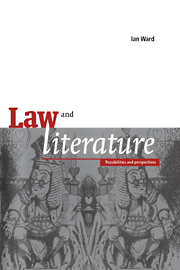8 - Ivan Klima's Judge on Trial
Published online by Cambridge University Press: 29 September 2009
Summary
What unites all law and literature scholars is the belief that literature impresses upon us a sense of textual contingency. Such texts can be at once social, historical, political and ethical as well, of course, as literary. In other words, literary texts offer legal scholars a contextual window, and it is the purpose of this chapter to suggest that Ivan Klima's Judge on Trial presents precisely such a window. Through this window Klima presents not merely a catalogue of twentieth-century jurisprudence – at various points in the narrative, through his central character the lawyer Adam, Klima considers the whole gamut of legal theories, natural law, positivism, Kantianism and critical legal theory – but at the same time does so in the particular context of the modern novel and its portrayal of legal situations. The central themes of the novel, culminating in that of the alienated individual, makes Judge on Trial a suitable text for an investigation of many of the issues introduced in the previous chapter. Alienation, or the ‘politics of exclusion’, is the problem of the ‘human condition’, which Richard Weisberg has placed at the root of the modern novel's treatment of the ‘legal protagonist’, and which he suggests derives originally from Nietzsche and Heidegger. It is, of course, the alienation which George Steiner famously suggested had culminated in the ‘long and precise imagining’ represented by the Holocaust.
- Type
- Chapter
- Information
- Law and LiteraturePossibilities and Perspectives, pp. 157 - 171Publisher: Cambridge University PressPrint publication year: 1995

